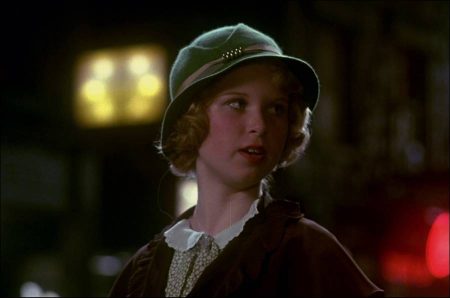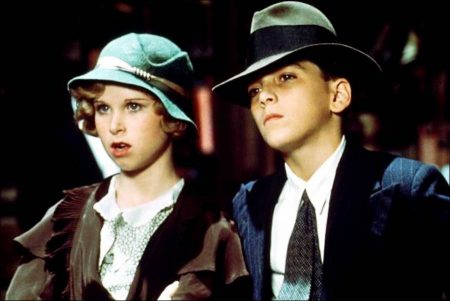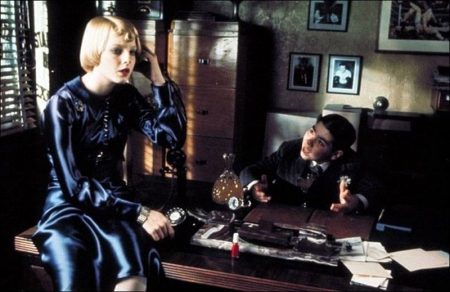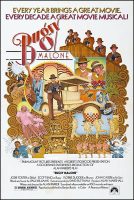Bugsy Malone movie storyline. During the Prohibition era, a mobster named Roxy Robinson is “splurged” by members of a gang, using rapid-fire cream-shooting “splurge guns”. Once splurged, a kid is “all washed up… finished”. Speakeasy boss Fat Sam introduces himself and Bugsy Malone, a boxing promoter with no money (“Bugsy Malone”).
At Fat Sam’s speakeasy, there is much dancing and singing (“Fat Sam’s Grand Slam”). Fat Sam is worried that his rival Dandy Dan will try to take control of the speakeasy. Blousey Brown, an aspiring singer, has come for an audition, but Sam is too distracted to see her. Bugsy meets Blousey when he trips over her luggage. He is smitten and flirts with her.
Fat Sam’s is raided by Dandy Dan’s men, who shoot up the place. Dandy Dan’s men continue to attack Fat Sam’s empire, eventually taking away rackets and splurging members of Fat Sam’s gang. Fat Sam sends all his available men, except Knuckles, to see if they can track down the guns. They are ambushed at a laundry and splurged by Dandy Dan’s gang.

Bugsy returns to Fat Sam’s to arrange a new audition for Blousey. Fat Sam’s girlfriend, the chanteuse Tallulah, makes a pass at him. Although Bugsy rejects her flirtation, Tallulah plants a big kiss on Bugsy’s forehead when Blousey enters; Blousey is jealous. Fat Sam hires Blousey after her audition, but she refuses to speak to Bugsy (“I’m Feelin’ Fine”).
Fat Sam hires Bugsy to accompany him to a meeting with Dandy Dan. The meeting is a trap, but Bugsy helps Fat Sam escape. Gratefully, Fat Sam pays him $200. Bugsy and Blousey reconcile and have a romantic outing on a lake; Bugsy promises to take her to Hollywood. When he returns Sam’s car to the garage, he is attacked and his money is stolen. Bugsy is saved by Leroy Smith, who assaults the attackers and drives them away. Bugsy realizes that Leroy has the potential to be a great boxer.
Bugsy introduces Leroy to Cagey Joe and helps him train (“So You Wanna Be a Boxer?”). Fat Sam again seeks Bugsy’s aid after his assistant Knuckles is unintentionally killed. Bugsy resists, but Fat Sam offers $400, enough money to keep his promise to Blousey. Blousey is disappointed when she learns that Bugsy hasn’t bought the tickets to California yet (“Ordinary Fool”). Bugsy and Leroy follow Dandy Dan’s men to a warehouse, where the guns are being stashed. The two of them can’t take the place alone, so Bugsy recruits a large group of down-and-out workers at a soup kitchen (“Down and Out”).
Bugsy Malone is a 1976 gangster musical comedy film written and directed by Alan Parker. The film was Parker’s feature film directorial debut. A co-production of United States and United Kingdom, it features child actors playing adult roles, with Jodie Foster, Scott Baio, John Cassisi, and Martin Lev in major roles. The film tells the story of the rise of “Bugsy Malone” and the battle for power between “Fat Sam” and “Dandy Dan”.
Set in New York City, it is a gangster movie spoof, substituting machine guns that fire gobs of whipped cream instead of bullets. The film is based loosely on events in New York and Chicago during Prohibition era, specifically the exploits of real-life gangsters such as Al Capone and Bugs Moran. Parker lightened the subject matter considerably for the children’s market, and the film received a G rating in the U.S.
Bugsy Malone premiered at the 1976 Cannes Film Festival, where it competed for the Palme d’Or. The film was released theatrically in the UK on 12 July 1976 by Fox-Rank Distributors, and in the U.S. by Paramount Pictures. The film was a commercial success in the UK but not in other territories. It received acclaim from critics for its screenplay, musical numbers, unique narrative and performances of the cast (particularly Foster’s).
In 2003, Bugsy Malone was voted #19 on a list of the 100 greatest musicals, as chosen by viewers of Channel 4 in the UK. In 2008, Empire ranked it 353rd on their list of 500 greatest movies of all time. The film received eight nominations at the 30th British Academy Film Awards, including Best Film and won three: Best Supporting Actress and Most Promising Newcomer to Leading Film Roles for Foster and Best Screenplay for Parker. The film also received three nominations at the 34th Golden Globe Awards including Best Motion Picture – Musical or Comedy.
Bugsy Malone was Alan Parker’s first feature film. Parker was trying to find a film project that was not “parochial” and decided upon an American gangster setting: “I had four young children and we used to go to a cottage in Derbyshire at weekends. On the long, boring car journey up there, I started telling them the story of a gangster called Bugsy Malone. They’d ask me questions and I’d make up answers, based on my memories of watching old movie reruns as a kid.” His eldest son suggested children should be cast as the “heroes”.
The film was rehearsed and shot in England, largely on Pinewood Studios’ “H” stage, with locations in Black Park Country Park (Wexham, Buckinghamshire) and primarily the former Huntley & Palmers buildings in Reading, Berkshire. The “splurge firearm” proved to be problematic. After initial experiments with cream-filled wax balls proved painful, Parker decided to abandon the idea of filming the firearms directly. Instead, the firearms fired ping-pong balls, and a fast cut to a victim being pelted with “splurge” was used to convey the impression of the rapid-firing firearms.
Parker chose Paul Williams to score the film in order to get a more “palatable” modern sound, and simply because he liked him.[12] Williams had scored Brian De Palma’s commercial failure Phantom of the Paradise, but had also written huge pop-radio hits (such as “We’ve Only Just Begun” (lyrics), and “(Just An) Old Fashioned Love Song”). In fact, Williams would soon win an Oscar for his song “Evergreen” from the film A Star Is Born (1976).
Williams felt that “…the challenge for me was to provide songs that reflected the period… and yet maintained an energy that would hold the young audiences attention.” According to Parker, Williams was writing while on tour, recording songs in different cities, and sending the completed tapes to Hollywood. Arriving during the first pre-shoot rehearsals, the songs had to be accepted and used as they were, with voices by Williams, Archie Hahn and others.
Neither the director nor the songwriter were comfortable with the results. Williams later wrote “I’m really proud of the work and the only thing I’ve ever doubted is the choice of using adult voices. Perhaps I should have given the kids a chance to sing the songs.” Parker also commented: “Watching the film after all these years, this is one aspect that I find the most bizarre. Adult voices coming out of these kids’ mouths? I had told Paul that I didn’t want squeaky kids voices and he interpreted this in his own way. Anyway, as the tapes arrived, scarcely weeks away from filming, we had no choice but to go along with it!”
Bugsy Malone (1976)
Directed by: Alan Parker
Starring: Scott Baio, Florrie Dugger, Jodie Foster, John Cassisi, Martin Lev, Paul Murphy, Sheridan Earl Russell, Paul Chirelstein, Andrew Paul, Jeffrey Stevens, Donald Waugh
Screenplay by: Alan Parker
Production Design by: Geoffrey Kirkland
Cinematography by: Peter Biziou, Michael Seresin
Film Editing by: Gerry Hambling
Costume Design by: Monica Howe
Set Decoration by: Harry Cordwell
Art Direction by: Malcolm Middleton
Music by: Paul Williams
MPAA Rating: None.
Distributed by: Fox-Rank Distributors (United Kingdom), Paramount Pictures (United States)
Release Date: June 26, 1976
Views: 243


